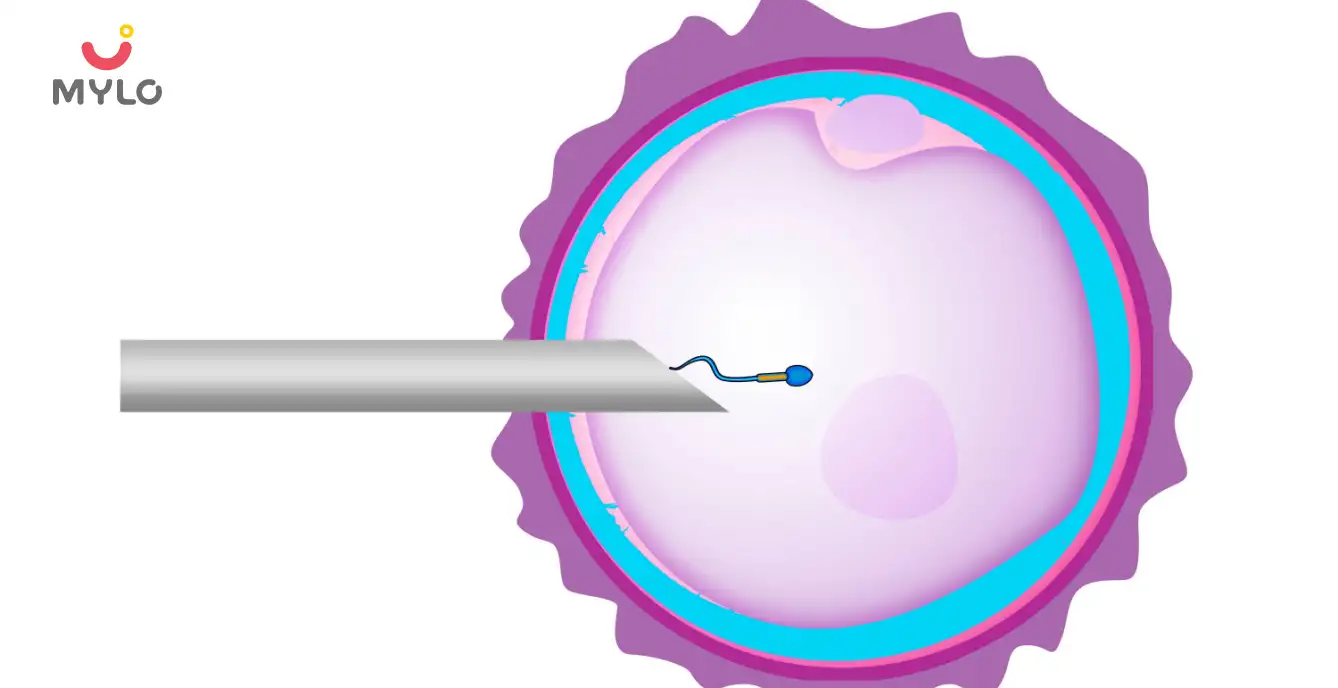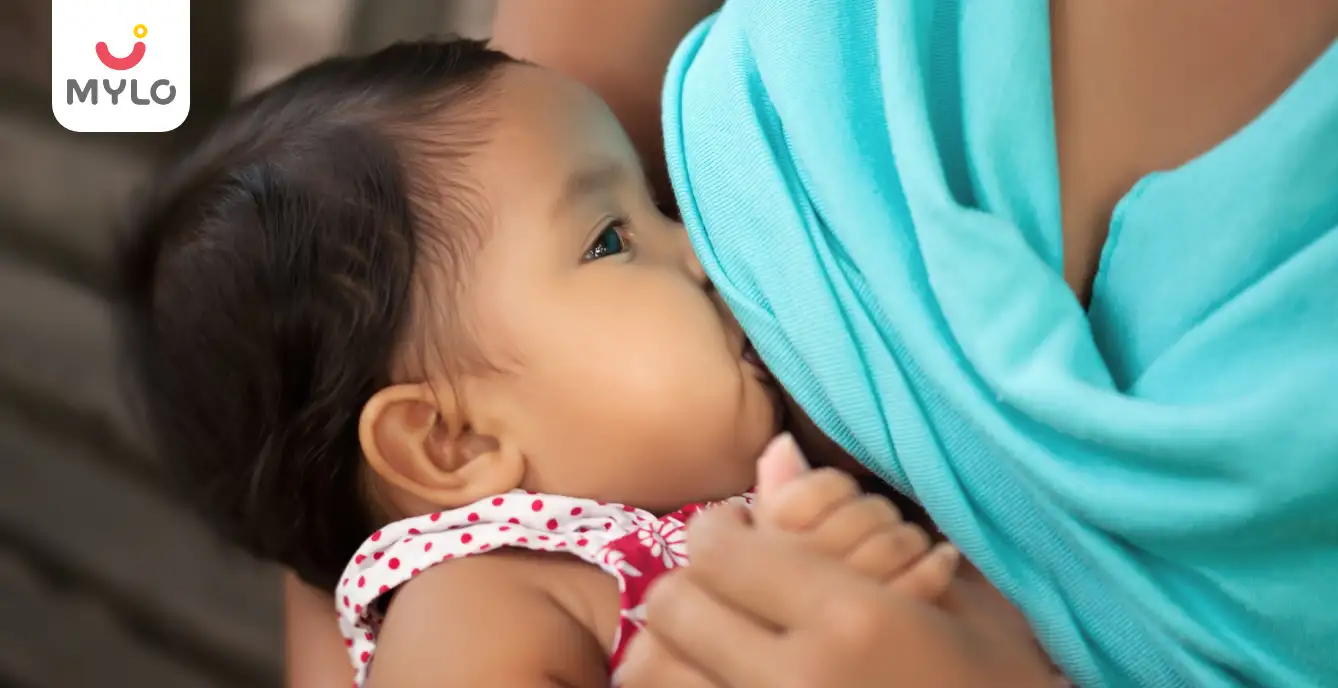- Home

- Baby Biting While Feeding: Expert Tips and Strategies for Prevention and Management
In this Article
Baby Care
Baby Biting While Feeding: Expert Tips and Strategies for Prevention and Management
Updated on 14 July 2023
Breastfeeding can be a pleasant and bonding experience for both mother and baby, but it can become challenging when the baby bites while feeding. Babies may bite for various reasons, such as teething, boredom, or attention-seeking. To prevent baby biting while feeding, it is recommended to ensure a proper latch, feed frequently, and pay attention to the baby's needs.
In this article, we will understand the signs of baby bite, potential reasons and home remedies for baby bites during breastfeeding.
What are the signs of baby biting while feeding?
Babies biting while feeding can be a frustrating and painful experience for mothers. It's important to recognize the signs of baby biting to address the issue promptly and these include:
-
One common sign is a sudden change in the baby's latch.
-
If the baby is usually latched properly but starts to slide the nipple out of their mouth while biting, it's a clear indication of biting.
-
Mothers may feel a sharp pain when the baby bites down.
-
Sometimes, babies may also pull away from the breast and look up at their mother while biting.
These signs should not be ignored as they can lead to further complications if not addressed in a timely manner.
You may also like : Baby Vomiting After Feeding: Understanding the Causes and Solutions for Upset Stomach
What are the reasons for baby biting nipple when breastfeeding?
Understanding the reasons behind baby biting the nipple can help mothers prevent and manage this behavior effectively. The reasons may include:
1. Teething
One common reason is teething. When babies start teething, they often seek relief by chewing on anything they can find, including the mother's nipple.
2. Improper latching
Another reason could be that the baby is not properly latched onto the breast. If the baby is not positioned correctly, they may end up biting the nipple instead of sucking.
3. Attention seeking
Some babies may bite while breastfeeding as a way to get attention or express frustration. By identifying the underlying cause, mothers can take appropriate measures to address the issue.
Understanding the developmental stages of baby bites
It is essential for mothers to understand the developmental stages of baby bites to manage the situation better. In the early months, babies explore the world through their mouths, and this includes biting during breastfeeding.
As they grow older, babies start teething, which can lead to increased biting tendencies. It is crucial to remember that biting is a temporary phase and usually subsides as the baby develops better feeding skills. By being patient and implementing appropriate strategies, mothers can help their babies navigate through this developmental stage without causing harm.
Home remedies for baby bites during breastfeeding
Let us learn some home remedies that can help you cope with baby biting nipple:
1. Use a cold compress:
Apply a cold compress to the affected area to numb the pain and reduce inflammation.
2. Apply a warm compress:
After using a cold compress, apply a warm compress to the affected area to soothe the pain.
3. Apply breast milk:
Apply a few drops of breast milk to the affected area. Breast milk contains antibacterial and anti-inflammatory properties that can help to heal the wound.
4. Use a nipple shield:
A nipple shield can help to protect the nipple from further damage and allow it to heal.
5. Use lanolin cream:
Lanolin cream can help to soothe the skin and promote healing. Apply a small amount to the affected area.
6. Take pain medication:
Over-the-counter pain medication such as ibuprofen or acetaminophen can help to reduce pain and inflammation.
7. Seek medical attention:
If the wound is severe or shows signs of infection, seek medical attention immediately.
You may also like : Painful Nipples During Breastfeeding: A Step-by-Step Approach for Managing Discomfort
How to prevent baby bites?
Prevention is key when it comes to managing baby bites. One effective way to prevent baby bites is to ensure that the baby is properly latched onto the breast. Proper positioning and attachment can minimize the chances of the baby biting.
Mothers should also be attentive and observe the baby's feeding cues. If the baby shows signs of being full or disinterested, it's best to end the feeding session to avoid any potential biting. It is also helpful to provide alternative teething toys or objects for the baby to chew on before and after breastfeeding to redirect their biting tendencies.
You may also like : Side Effects of Breastfeeding While Lying Down: Is It Worth the Risk?
Tips for managing baby biting while feeding
Let us understand some ways to manage baby biting nipple when breastfeeding:
1. Use the PACED approach:
This includes positioning, acting fast when sensing a bite coming, comforting your baby and giving a cold teether or pacifier, doing breast compressions or expressing milk to keep milk flowing, and distracting baby with talking or playing a game.
2. Be prepared to break suction:
Keep a finger at the ready, so you can break the suction quickly if your baby does try to bite.
3. Adjust the latch:
For a newborn, adjust the latch if it feels like biting during a feeding, especially if your baby has no teeth.
4. Offer a cold teether:
When you notice your baby is teething, offer a cold teether after feeding to soothe their gums.
5. Continue breastfeeding:
If your baby is ill, continuing breastfeeding is crucial, but the mother might need to adjust the positioning and consider wearing the baby or running a humidifier to keep the airways open.
FAQ’s
1. Why do babies bite when breastfeeding?
There are several reasons why babies may bite when breastfeeding including teething and feeling overwhelmed or overstimulated. Additionally, babies may bite as a way to explore their surroundings and test their newly developing motor skills.
2. How do you treat nipples from baby biting?
After a biting incident, mothers should gently remove the baby from the breast and inspect the nipples for any signs of damage. If there are visible injuries, it is recommended to clean the area with warm water and mild soap and applying a lanolin-based nipple cream.
Final Thoughts
Baby biting while feeding can be a challenging phase for both the mother and the baby. However, with patience, understanding, and the implementation of appropriate strategies, this behavior can be effectively managed. By recognizing the signs, understanding the reasons behind the biting, and implementing preventive measures, mothers can create a positive breastfeeding experience for themselves and their babies. Remember, if the biting persists or causes ongoing discomfort, it is crucial to seek professional advice to ensure the well-being of both mother and baby.
References
1. van der Veek SMC, de Graaf C, de Vries JHM, Jager G, Vereijken CMJL, Weenen H, van Winden N, van Vliet MS, Schultink JM.(2019). Baby's first bites: a randomized controlled trial to assess the effects of vegetable-exposure and sensitive feeding on vegetable acceptance, eating behavior and weight gain in infants and toddlers. BMC Pediatr.
2. Bernard-Bonnin AC. (2006).Feeding problems of infants and toddlers. Can Fam Physician.



Written by
Anandita Sharma
Drawing on more than a decade of expertise in administration, Anandita Sharma currently serves as a content operations e
Read MoreGet baby's diet chart, and growth tips

Related Articles
How Respiratory Syncytial Virus (RSV) Impacts Premature Babies Differently: What Every Parent Needs To Know
Adverbs: A Comprehensive Guide to help small children learn the usage of adverbs
Expand Your Child's Vocabulary with words that start with X: Easy, Positive, and Engaging Words, Animals, Countries, and Fruits
Unlocking Language Proficiency: The Ultimate Guide to Top 100 Sight Words for Kindergarten and Beyond
Related Questions
Influenza and boostrix injection kisiko laga hai kya 8 month pregnancy me and q lagta hai ye plz reply me

Hai.... My last period was in feb 24. I tested in 40 th day morning 3:30 .. That is faint line .. I conculed mylo thz app also.... And I asked tha dr wait for 3 to 5 days ... Im also waiting ... Then I test today 4:15 test is sooooo faint ... And I feel in ma body no pregnancy symptoms. What can I do .

Baby kicks KB Marta hai Plz tell mi

PCOD kya hota hai

How to detect pcos

RECENTLY PUBLISHED ARTICLES
our most recent articles

Periods
Period During Breastfeeding What Every New Mother Should Know

Brain Development
Role of Stories and Rhymes in Your Baby’s Brain Development

Male Infertility
Intracytoplasmic Sperm Injection (ICSI) How It Can Help Treat Male Infertility

Breastfeeding & Lactation
Baby Sleeping While Breastfeeding: Understanding the Causes and Solutions

Breast Lump
Lump in Breast During Breastfeeding How to Identify, Treat, and Prevent Lump Formation

Developmental Disorders
Understanding Down Syndrome: A Comprehensive Guide for Parents
- No Breast Milk After Delivery: What to Do & What are the Factors Responsible
- Lactation Failure: A Comprehensive Guide to Understanding the Causes and Solutions
- Breast Pain During Pregnancy: What to Expect and How to Find Relief
- Baby Spit Up: The Ultimate Guide to Causes, Prevention, and Management
- Unexplained Infertility: Breaking Down the Factors and Finding Solutions
- Mulethi: Unraveling the Therapeutic Potential of Licorice Root for Your Overall Health
- 5 Steps to a Healthy Lifestyle: The Blueprint for Your Wellness Journey
- Chandraprabha Vati: How This Potent Ayurvedic Formulation Can Boost Your Health
- Trichomoniasis: Meaning, Symptoms, Causes and Risks
- Gallstones in Pregnancy: Symptoms, Complications & Treatment
- Fertility Massage: A Holistic Approach to Boosting Fertility Your Chances of Conception
- Baby Vomiting After Feeding: Understanding the Causes and Solutions for Upset Stomach
- Why do you need to wear a high waisted panty during pregnancy?
- Top 5 Precautions You Should Take After Getting an IVF Treatment


AWARDS AND RECOGNITION
Mylo wins Forbes D2C Disruptor award
Mylo wins The Economic Times Promising Brands 2022
AS SEEN IN
















At Mylo, we help young parents raise happy and healthy families with our innovative new-age solutions:
- Mylo Care: Effective and science-backed personal care and wellness solutions for a joyful you.
- Mylo Baby: Science-backed, gentle and effective personal care & hygiene range for your little one.
- Mylo Community: Trusted and empathetic community of 10mn+ parents and experts.
Product Categories
baby carrier | baby soap | baby wipes | stretch marks cream | baby cream | baby shampoo | baby massage oil | baby hair oil | stretch marks oil | baby body wash | baby powder | baby lotion | diaper rash cream | newborn diapers | teether | baby kajal | baby diapers | cloth diapers |






